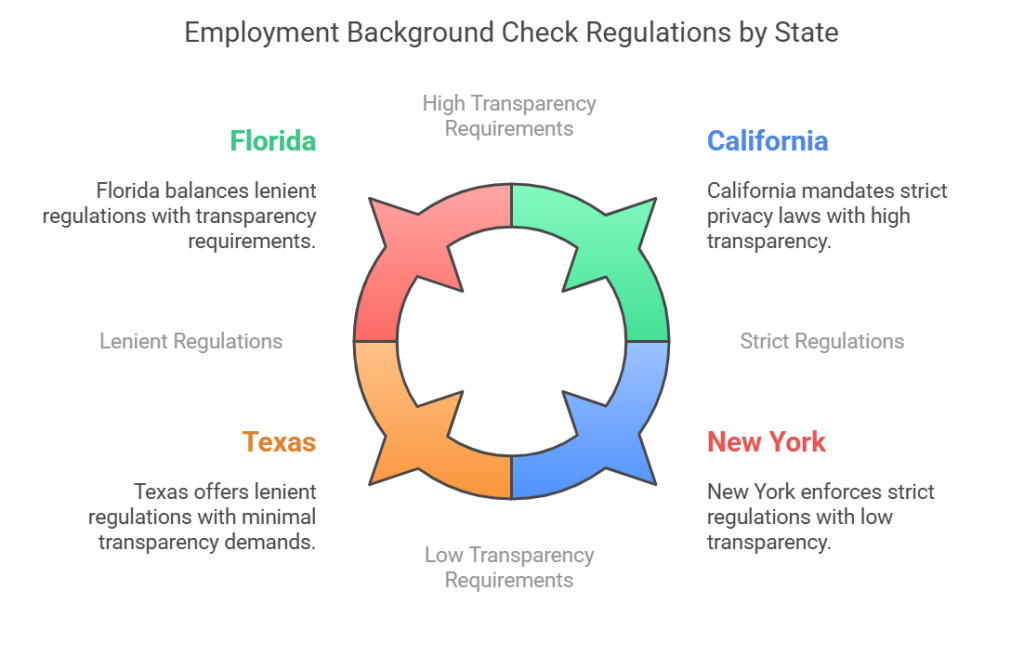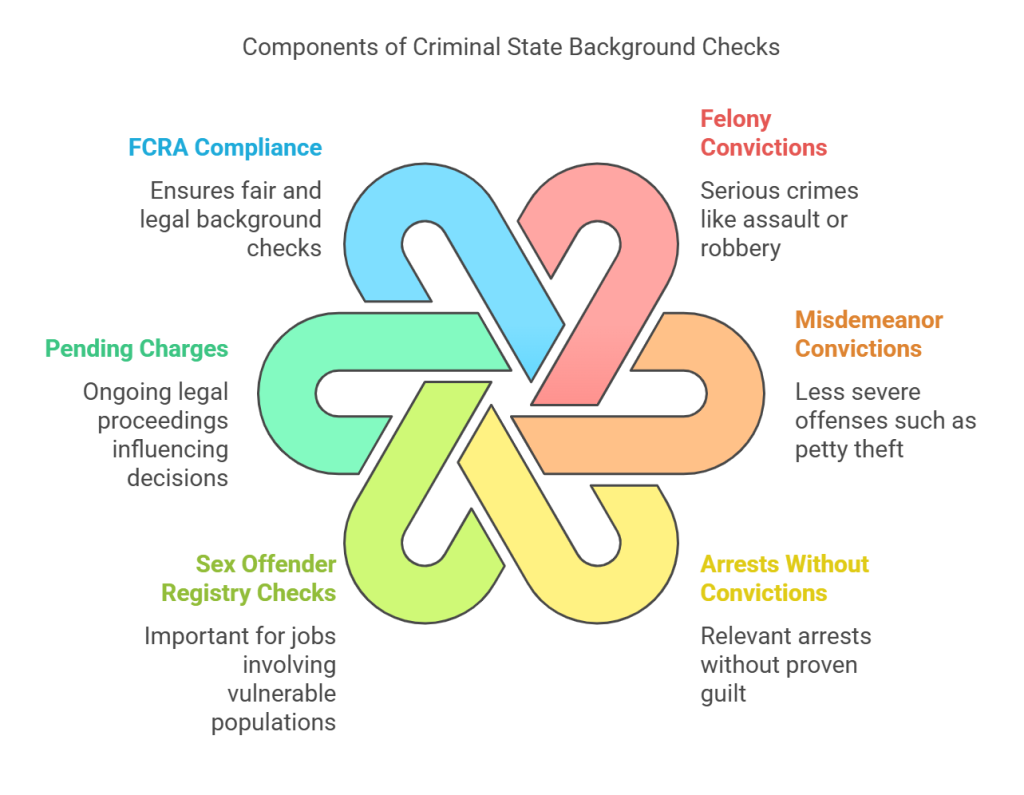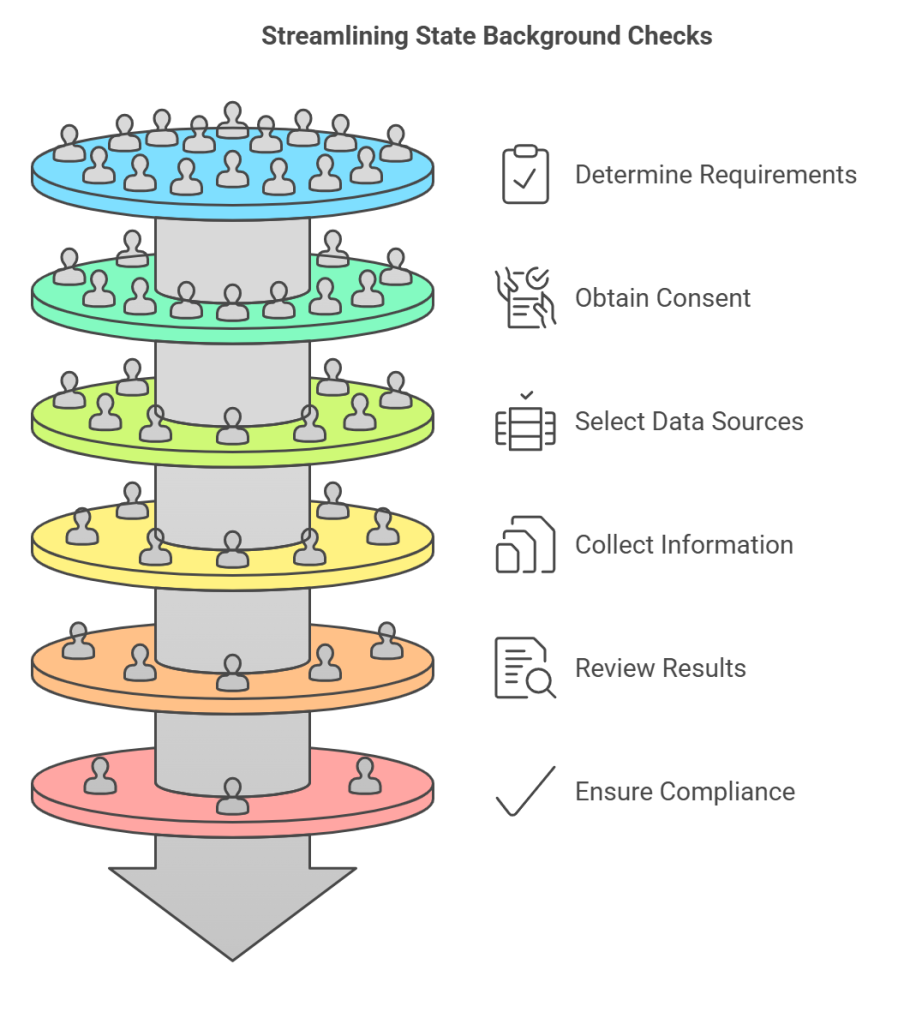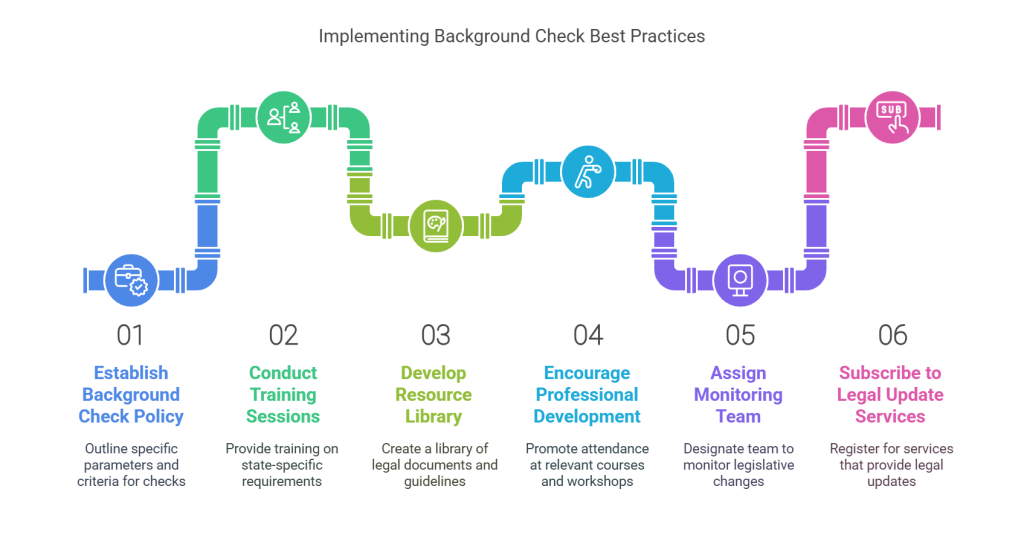Background checks are critical to hiring new employees. They provide essential information about potential hires, helping businesses maintain a safe and trustworthy environment. This guide will cover everything HR professionals and recruiters need to know about state background checks, including the differences in state requirements, compliance issues, and practical advice for conducting thorough checks.
Key Takeaways
- State background checks provide a comprehensive view of an individual's criminal history within a specific state.
- These checks typically include information from state police records, court records, and other state-level databases.
- State background checks are often more detailed than national checks but less comprehensive than county-level searches.
- The scope and availability of information can vary significantly between states due to different laws and reporting practices.
- Employers should consider combining state background checks with other screening methods for a more complete picture of a candidate's history.
Introduction
State background checks are not just a formality but vital for creating a secure and transparent hiring process. As we move into 2024, the relevance of these checks continues to grow, providing businesses with essential insights into potential hires. In this guide, we will deeply dive into the world of state background checks. We'll cover everything from the various state requirements to the legal and compliance issues HR professionals need to consider. Whether you're an experienced recruiter or new to the field, this guide will help you navigate the complexities of state background checks with ease and confidence.
EXPERT INSIGHT: It is our duty as HR specialists to create work environments that value honesty, safety, and trust. State background checks are essential instruments for guaranteeing that every employment choice is done carefully and diligently; they are not only a formality. We can safeguard our organizations and demonstrate respect for the communities and people we serve by being aware of the subtleties of state-specific regulations. Comprehensive, legal checks allow us to balance opportunity and accountability, because each applicant has a unique narrative to share. Together, we can build teams that are not only competent but also based on the values that underpin our company culture. - Charm Paz, CHRP
What Are State Background Checks?
State background checks are a vital tool in an employer's arsenal, providing detailed information about a potential hire’s past within a specific state. Unlike federal background checks, which cast a wide net across multiple states and federal databases, state background checks offer a more focused look at an individual’s history within a particular jurisdiction.
Definition
A state background check involves searching state-level databases and records to screen for criminal history, employment verification, educational records, and sometimes additional information such as driving records. These checks delve into state-specific details that may not appear in a federal check, ensuring employers get a more localized view of potential employees.
Purpose
The primary role of state background checks is to enhance the hiring process by verifying critical aspects of a candidate's background. These checks help employers confirm whether an applicant has any criminal history, verify past employment and educational achievements, and occasionally check other state-regulated aspects like driving records. By doing so, employers ensure they make informed hiring decisions, minimize risks, and maintain a safe and honest work environment.
Types of Information Checked
In a typical state background check, several key areas are reviewed:
- Criminal Records: This includes detailed information on any misdemeanors or felonies committed within the state. Arrest records might also be included, although the extent of this will depend on state laws and regulations.
- Employment History: Past employment details are verified to ensure that the experiences listed on a candidate's resume are accurate. This can include dates of employment, job titles, and reasons for leaving previous positions.
- Educational Verification: Degrees, certifications, and other educational achievements claimed by the applicant are cross-checked with academic institutions within the state.
- Driving Records: For positions where driving is a key component, employers might also review state driving records to check for violations, DUIs, or other infractions.
- State-Specific Registries: Depending on the state, additional records might be included, such as sex offender registries or professional licensure statuses.
Understanding the scope and limitations of state background checks enables employers to tailor their screening processes effectively and ensures they obtain the most relevant and crucial information needed to make sound hiring decisions.

Differences in State Requirements
Variation in State Laws
Navigating the landscape of state background check requirements can feel like piecing together a puzzle with mismatched pieces. Each state has laws that dictate what can and cannot be included in a background check. For instance, some states allow for a comprehensive review of convictions and arrests, while others limit the scope to convictions only. This patchwork of regulations means that a one-size-fits-all approach won't cut it.
Focus on Key States

California stands out with its rigorous privacy laws. Employers must comply with the California Consumer Privacy Act (CCPA), requiring businesses to inform applicants about collecting personal data and obtain their consent. Additionally, California limits the consideration of criminal records to the last seven years, except for certain roles.
New York has its own set of challenges. The New York City Fair Chance Act is particularly notable, mandating that employers cannot ask about an applicant's criminal history until after a conditional job offer is made. New York State also follows the seven-year rule for criminal convictions but has additional protections for individuals with records.
In Texas, the rules are more lenient. There's a greater focus on business discretion, and no specific state law limits the timeframe for criminal checks. However, employers must adhere to the Fair Credit Reporting Act (FCRA) and other federal regulations.
Florida offers a middle ground. The state doesn't impose substantial restrictions on background checks but requires employers to be transparent about their background check policies, especially for positions involving vulnerable populations.
Compliance with State-Specific Regulations
Staying compliant with varying state laws is crucial to avoid legal repercussions. Here's a simplified approach:
- Know Your States: Identify the states where you operate and familiarize yourself with their specific background check laws.
- Update Policies Regularly: State laws can change. Make it a habit to review and update your background check policies at least annually.
- Employee Training: Educate your HR team on the nuances of state-specific regulations. This will ensure that they are aware of and adept at handling the complexities inherent in state requirements.
- Use Technology: Consider using background check software compliant with state-specific laws. Many services will help you stay updated with legal changes, minimizing non-compliance risk.
Understanding these variations and staying on top of compliance measures will help you effectively navigate the complexities of state background checks.

States with 10-Year Background Check Policies
Explanation of 10-Year Background Checks
A 10-year background check refers to the extent of historical data reviewed during the screening process, usually encompassing the last decade of an individual's relevant records. This policy is adopted by some states to strike a balance between providing a comprehensive view of a candidate's history and ensuring that the information remains pertinent and manageable. These checks commonly include criminal records, employment history, and educational verification within the past ten years, allowing employers to make informed hiring decisions based on recent and significant data.
List of States
Several states have adopted the 10-year background check policy, recognizing its benefits in maintaining a thorough vetting process while respecting the potential for individual rehabilitation and change. Notable states with this policy include:
- California: Known for its stringent employment laws, California mandates a 10-year limit on background checks for criminal records.
- Massachusetts: Similar to California, Massachusetts limits criminal record checks to the past 10 years, aligning with its progressive stance on privacy and employment rights.
- Nevada: This state restricts the consideration of felony convictions older than 10 years, barring certain exceptions for high-security positions.
Relevance and Impact
Implementing a 10-year background check can significantly influence the hiring process. By focusing on the most recent decade, employers gain insight into a candidate's current behavior and qualifications while offering individuals a chance at a clean slate after a substantial period of demonstrated reliability. This can lead to a more balanced and fair hiring process, potentially reducing discrimination against those who have moved past previous indiscretions.
In practice, this means HR professionals must diligently understand and effectively apply the 10-year limitation. Ensuring compliance with these policies adheres to state regulations. It promotes a fair chance for candidates to be evaluated based on recent history, contributing to a more equitable and inclusive workforce.
Criminal State Background Checks

When hiring, understanding an applicant's criminal history is indispensable. Criminal state background checks serve this purpose by providing insights into past misdemeanors, felonies, and arrests that could impact hiring decisions.
Purpose and Importance
Employers utilize criminal state background checks to maintain a safe work environment. Knowing the criminal history of potential employees helps mitigate risks and protect company assets, other employees, and even customers. These checks are especially crucial for positions requiring high levels of trust, such as finance, education, or healthcare roles.
Information Included
Criminal state background checks typically include the following:
- Felony Convictions: Serious crimes like assault, robbery, or fraud.
- Misdemeanor Convictions: Less severe offenses such as petty theft or public intoxication.
- Arrests Without Convictions: While these don't imply guilt, they might still be relevant depending on the role.
- Sex Offender Registry Checks: Particularly important for jobs involving vulnerable populations.
- Pending Charges: Ongoing legal proceedings that might influence the hiring decision.
Legal Considerations
Navigating the legal landscape of criminal background checks requires adherence to several regulations. Two primary legal frameworks ensure that the process remains fair and compliant:
Fair Credit Reporting Act (FCRA): This act governs how background checks are conducted and used. Under FCRA, employers must:
- Obtain written consent from the applicant before conducting a background check.
- Inform applicants if the checks result in adverse employment actions, and provide them with a copy of the report and a summary of their rights.
EEOC Guidelines: The Equal Employment Opportunity Commission (EEOC) guidelines aim to prevent discrimination based on criminal history. Employers must consider:
- The nature and gravity of the offense.
- The time that has elapsed since the offense or completion of the sentence.
- The nature of the job sought.
In some states, employers should also be aware of "Ban the Box" laws, which prohibit asking about criminal history on initial job applications to ensure fairer hiring practices.
By adhering to these guidelines and conducting thorough criminal state background checks, employers can make informed and legally compliant hiring decisions.
Conducting State Background Checks

Selecting a Method
When conducting state background checks, one of the first decisions is whether to handle the process in-house or hire a third-party agency.
In-house: Conducting background checks internally can give you more control over the process and may reduce costs. However, it requires a dedicated team familiar with state laws, compliance requirements, and the technical aspects of retrieving and analyzing data.
Third-party agencies: These agencies specialize in background checks and can often deliver more thorough and faster results. They stay up-to-date with state-specific regulations and can handle the complexities of multi-state checks. This option may be more expensive, but it can save your team time and ensure compliance.
Steps to Conduct
- Determine Requirements: Start by understanding the specific requirements for the states in which you are hiring. This includes knowing what types of checks are mandated (e.g., criminal records, employment history) and any limitations on what can be reported.
- Obtain Consent: Legally, you must get written consent from the candidate before conducting a background check. Make sure this is included in your hiring process.
- Select Data Sources: Choose reliable sources for your data. This might include state criminal databases, educational institutions, and past employers.
- Collect Information: Gather all the necessary information from various sources. Be thorough to ensure no relevant details are missed.
- Review Results: Analyze the data collected. Look for any red flags that could impact the hiring decision, such as criminal records or false employment claims.
- Ensure Compliance: Verify that the report complies with all applicable laws, including the Fair Credit Reporting Act (FCRA) and state-specific regulations.
- Communicate with the Candidate: If any adverse information is found, communicate with the candidate professionally and provide them an opportunity to respond or clarify.
Challenges and Solutions
Complex Regulations: Navigating the intricate web of state-specific laws can be overwhelming.
Solution: Regular training for HR staff and partnering with a knowledgeable third-party agency can help stay compliant.
Data Accuracy: The risk of outdated or inaccurate information complicates the decision-making process.
Solution: Utilize reputable sources and cross-verify information when possible.
Time Constraints: Background checks can be time-consuming, delaying the hiring process.
Solution: Streamline your process using automated tools and consider third-party agencies to expedite turnaround times.
By understanding the logistical and legal aspects of conducting state background checks, HR professionals can streamline their hiring processes and mitigate risks, ensuring that they bring on board candidates who are qualified and align with the company’s standards of trust and safety.
Compliance and Legal Considerations
Understanding the legal landscape is paramount when it comes to state background checks. Non-compliance can result in hefty fines and legal repercussions, tarnishing your company's reputation.
Fair Credit Reporting Act (FCRA)
The FCRA regulates the accuracy and privacy of information in consumer reports. Employers must comply with FCRA guidelines during background checks. This involves obtaining written consent from the candidate beforehand and informing them if a report will be used to make employment decisions. If the check reveals adverse information, the candidate must be notified before any negative action is taken. This ensures procedural fairness and transparency, safeguarding both the employer and the applicant. For further information, refer to the Fair Credit Reporting Act (FCRA).
State-Specific Laws
Each state has its own set of regulations regarding background checks. For instance, California has the Investigative Consumer Reporting Agencies Act (ICRAA), which imposes stricter rules than the FCRA, particularly on handling adverse information. In New York, Article 23-A mandates consideration of specific factors before disqualifying a candidate based on their criminal history. Understanding these regulations is essential to ensure compliance and avoid legal pitfalls. Non-compliance can lead to severe legal consequences, including fines and lawsuits.
Communication with Candidates
Communication is key when dealing with background check results. If you decide not to hire a candidate based on information found in a background check, you are legally required to follow the adverse action process. This involves:
- Providing a pre-adverse action notice, including a copy of the background check and a summary of rights under the FCRA.
- Allowing the candidate time to respond or dispute the information.
- If you proceed with the adverse hiring decision, provide a final adverse action notice.
Handle these communications with sensitivity and professionalism. This will maintain the company’s credibility and show respect for the candidate's rights, reducing the risk of potential disputes or lawsuits.
By adhering to these compliance and legal considerations, HR professionals can execute state background checks effectively while minimizing legal risks and fostering an environment of fairness and transparency.

Best Practices for HR Professionals

Building a Robust Policy
Establishing a comprehensive background check policy is essential for maintaining uniformity and ensuring compliance across various jurisdictions. Start by outlining the specific parameters of the background checks, including what types of checks will be conducted (criminal, employment, education verification) and the criteria for disqualification. Make sure to explicitly state how these checks will be used in the hiring decision process to avoid any ambiguity. Incorporate flexibility to account for stringent state-specific laws while maintaining core principles applicable across all states to avoid legal pitfalls.
Training and Resources
Consistency is vital, and the best way to achieve it is through thorough training and continuous education for your HR team. Conduct regular training sessions on understanding and navigating state-specific requirements. Develop a resource library with all necessary legal documents, guidelines, and best practice manuals. Encourage your team to attend webinars, workshops, and other professional development courses to stay adept at handling the nuances of background checks. An informed team reduces the risk of non-compliance and ensures a smooth background check process.
Keeping Up-to-Date
Laws and regulations regarding background checks are continually evolving. Assign a team member or create a dedicated team responsible for monitoring legislative changes at both the state and federal levels. Subscribing to legal update services, participating in HR-focused forums, and maintaining a connection with legal consultants can be effective strategies. Regularly update your policies and procedures to reflect the latest guidelines. Having a proactive approach in staying updated not only ensures compliance but also reinforces the integrity and reliability of your hiring process.
By adopting these best practices, you can develop a robust, adaptable, and compliant background check system that enhances your hiring process and fosters a safe and trustworthy work environment.
Resources and Further Reading
Leveraging the right resources is crucial when examining the complexities of state background checks. Below, some carefully curated links offer additional insights and in-depth information, helping HR professionals and recruiters stay informed and compliant.
- Understanding Consumer Reporting Agencies - A thorough guide on different consumer reporting agencies, explaining how they gather and present data.
- Most Common Background Check Questions - Answers to frequent questions about background checks, offering clarity on typical concerns and scenarios.
- Fair Credit Reporting Act (FCRA) - Comprehensive resource detailing the Fair Credit Reporting Act, essential for understanding your legal obligations.
- Equal Employment Opportunity Commission (EEOC) - Official EEOC guidelines on how to handle the use of arrest and conviction records in employment decisions.
By incorporating these resources into your routine, you can ensure your state background checks are both thorough and compliant, reducing legal risks and fostering a safe work environment. Whether you're clarifying common questions or delving into legal requirements, these links serve as vital tools to support your hiring processes.
Frequently Asked Questions (FAQ)
Can I rely solely on state background checks?
While state background checks provide crucial information, they should not be the sole source of your screening process. State checks can miss data from other states and federal levels. A comprehensive check combining local, state, and federal information is advisable for a holistic view.
How accurate are state background checks?
The accuracy of state background checks varies widely, depending on the state's reporting systems and the completeness of their databases. Some states regularly update their records, while others might have outdated or incomplete information. Therefore, it's essential to verify and cross-reference findings.
What should I do if something unexpected shows up in a state background check?
If an unexpected finding arises, follow the Fair Credit Reporting Act (FCRA) guidelines: notify the candidate and provide them with a copy of the report, a summary of their rights, and an opportunity to dispute any inaccuracies. Always ensure a fair and transparent process.
How often should background checks be updated?
There isn't a one-size-fits-all answer. However, it's generally recommended that background checks be conducted at least once a year for roles with sensitive responsibilities or access to confidential information. Additionally, stay updated on any new regulations or state-specific requirements that could affect the frequency of checks.
Conclusion
Navigating the complexities of state background checks is not just a procedural necessity but a strategic imperative for maintaining a safe, secure, and legally compliant workplace. This guide has walked you through the essential elements, from understanding the unique requirements of different states to staying compliant with laws like the Fair Credit Reporting Act.
In today's dynamic hiring landscape, thorough and compliant background checks form the bedrock of sound hiring practices. They protect your organization from potential liabilities and help build a trustworthy workforce. HR professionals must stay updated, adapting policies to evolving regulations and best practices.
Remember, the goal is not just to check boxes but to promote a culture of transparency and due diligence. Prioritize the integrity of your hiring processes, and you’ll comply with legal mandates and foster a safer, more reliable environment for everyone involved.

GCheck Editorial Team
Meet the GCheck Editorial Team, your trusted source for insightful and up-to-date information in the world of employment background checks. Committed to delivering the latest trends, best practices, and industry insights, our team is dedicated to keeping you informed.
With a passion for ensuring accuracy, compliance, and efficiency in background screening, we are your go-to experts in the field. Stay tuned for our comprehensive articles, guides, and analysis, designed to empower businesses and individuals with the knowledge they need to make informed decisions.
At GCheck, we're here to guide you through the complexities of background checks, every step of the way.






